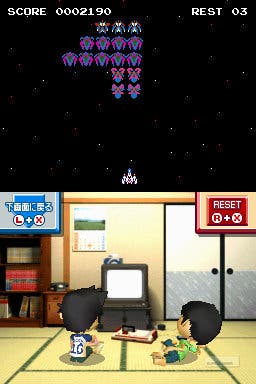Retro Game Challenge
Something old, something new.
Every time a game's challenges are cleared the calendar rolls forward a few months and the young Arino presents you with the latest issue of GameFan magazine. Written in the undemanding style of a mid-eighties game magazine for young boys, it perfectly parodies the tone of the era. Sub-plots are introduced as you read of editors leaving for rival magazines or heading off into development while young staff writers make their way up through the editorial ranks. These stories lend the nostalgia verisimilitude while the content of the magazine - timesaving tips and cheats of the games you're working through for Arino - prove an invaluable asset.
The game perfectly captures the sense of build/release excitement felt by the young consumer. The young Arino's anticipation for newly announced titles is infectious. He palpitates at the mere whisper of a new game, trading techniques and secrets for his current favourites with friends in the school playground (relaying them to you breathlessly each day) and following the exploits of professional gamers through GameFan's pages. His unbridled enthusiasm for the hobby is inspiring, and yet more evidence of the developer's skill in appealing to the older gamer's younger and, perhaps, more gullible self.

The eight games themselves are strong enough to stand alone from the joke of their pastiche. While Rally King SP, released as a giveaway to random GameFan subscribers as a commercial deal with Inokichi Noodles, parodies the popular sponsor-driven variants of the Japanese Famicom era, the racing itself is precise and enjoyable, ensuring that you'll want to play the game even after the challenges are cleared. The satire is a bonus. When your character asks Arino what the difference between Rally King and Rally King SP is, he answers: "Awesome commercials are inserted between races!” It's biting commentary on the state of the videogame industry, albeit, um, the Japanese videogame industry circa 1986.
The games and their challenges are far easier than many bona-fide 8-bit titles and it's not until the last few that the average gamer will have any difficulty clearing tasks. Conversely, the mechanics are often more complex than titles of the era, perhaps bespeaking the fact that our expectations of retrogaming's depths today outstrip its more simple reality. Sadly, there's an over-reliance on sequels (perhaps yet more satire from the game makers?) and at least half of the titles you'll play in the second half of the experience are slightly enhanced updates of earlier releases (apart from Robot Ninja Haggle Man 3, which is a wonderful departure).
Once Arino's core set of challenges are cleared, each game is unlocked in a Freeeplay Mode. Here the game keeps track of a dizzying number of statistics, encouraging high-score attempts, but divorced from the focus of Arino's challenges the games suffer, revealing their inevitable shallowness. But unlike all other retro game compilations, the point of Retro Game Challenge isn't the compilation so much as the context and the commentary and an unapologetic celebration of gaming's formative days. In that sense it's a triumph, offering any gamer who grew up with videogames, whatever the era, a keen sense of that time. For many of us trying to recapture those childhood feelings of awe and wonder, Retro Game Challenge gets to the very heart of why we still play videogames and for that is to be applauded.
